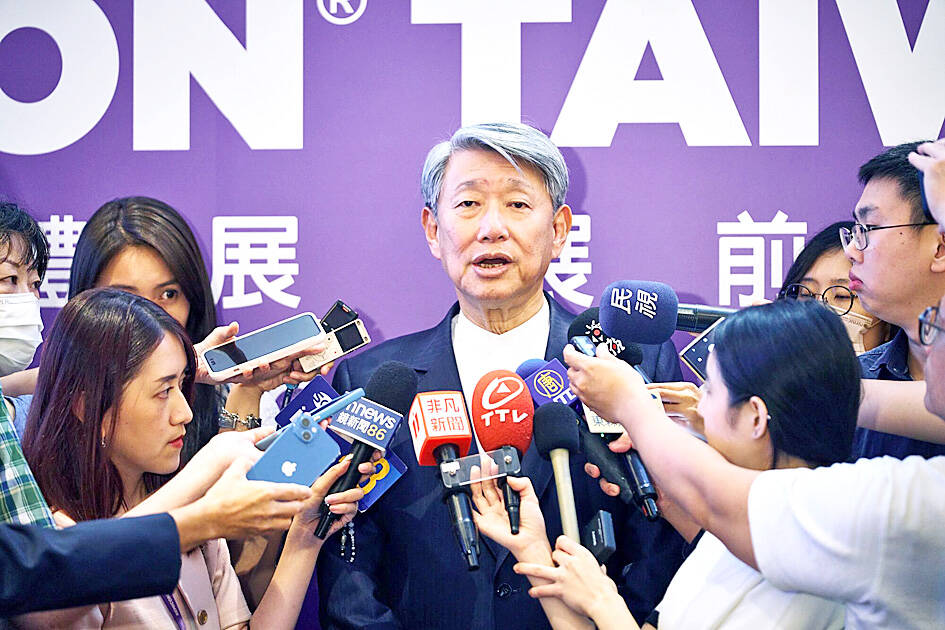Minister of Economic Affairs J.W. Kuo (郭智輝) yesterday said Taiwan’s government plans to set up a business service company in Kyushu, Japan, to help Taiwanese companies operating there.
“The company will follow the one-stop service model similar to the science parks we have in Taiwan,” Kuo said. “As each prefecture is providing different conditions, we will establish a new company providing services and helping Taiwanese companies swiftly settle in Japan.”
Kuo did not specify the exact location of the planned company but said it would not be in Kumamoto, the Kyushu prefecture in which Taiwan Semiconductor Manufacturing Company (TSMC, 台積電) has a fab and is preparing to build another one.

Photo: An Rong Xu, Bloomberg
Different prefectures in Kyushu are offering different incentives for foreign companies, "so the service company we set up will help organize the information and facilitate the 'localization' of Taiwanese enterprises," Kuo said.
Nagasaki, Oita, Miyazaki, and Kitakyushu are some of the Kyushu prefectures that have expressed interest in welcoming Taiwanese companies, he said.
Currently, the plan is limited to Kyushu, he said in response to a question on whether other Taiwanese one-stop service centers will be set up in Japan in the future.
Photo: Grace Hung, Taipei Times
"For other areas such as Kansai and Kanto, it would depend on the nature of the local industries, as most of the Taiwanese companies currently in Japan are part of the supply chain [for the semiconductor industry]," Kuo said.
Asked about a report that TSMC was planning to build a third fab in Japan, Kuo said that question should be directed to the company.
A Japanese media outlet on Sunday quoted Kuo as saying that TSMC would build a third fab in Japan to produce leading-edge chips after 2030.
Kuo, who was doorstepped by reporters ahead of a news conference for this week’s Semicon Taiwan exhibition, also pushed back at criticism of Taiwan by US Republican presidential nominee and former president Donald Trump, and denied that Taiwan took the US chip industry.
“Of course Taiwan is not stealing the chip industry from the US,” Kuo told reporters in Taipei. “The chips we made are commissioned by US companies, which still have the highest gross margin. Trump might have some misunderstanding on such matters, and we will clarify that.”
Trump rattled Taiwan officials and the country’s markets with comments published on July 16 in Bloomberg Businessweek that criticized Taiwan over its chip sector and urged it to pay the US for protection.
That has raised fears that if Trump succeeds US President Joe Biden, who has repeatedly said the US would defend Taiwan from a Chinese attack, he would be less committed, viewing Taiwan in transactional terms.
“Taiwan took our chip business from us,” Trump said at the time. “I mean, how stupid are we? They took all of our chip business. They’re immensely wealthy.”
Since Trump’s comments, Taiwanese officials have tried to talk up the nation’s efforts to uphold its part of the relationship.
In response to Trump’s call for Taiwan to “pay” the US for protection, Premier Cho Jung-tai (卓榮泰) said the country has increased defense spending and extended the conscription period.
“It’s our shared responsibility and goal to maintain the peace and stability in the Taiwan Strait and the Indo-Pacific region,” Cho said on July 17.

Taiwanese suppliers to Taiwan Semiconductor Manufacturing Co. (TSMC, 台積電) are expected to follow the contract chipmaker’s step to invest in the US, but their relocation may be seven to eight years away, Minister of Economic Affairs J.W. Kuo (郭智輝) said yesterday. When asked by opposition Chinese Nationalist Party (KMT) Legislator Niu Hsu-ting (牛煦庭) in the legislature about growing concerns that TSMC’s huge investments in the US will prompt its suppliers to follow suit, Kuo said based on the chipmaker’s current limited production volume, it is unlikely to lead its supply chain to go there for now. “Unless TSMC completes its planned six

Power supply and electronic components maker Delta Electronics Inc (台達電) yesterday said second-quarter revenue is expected to surpass the first quarter, which rose 30 percent year-on-year to NT$118.92 billion (US$3.71 billion). Revenue this quarter is likely to grow, as US clients have front-loaded orders ahead of US President Donald Trump’s planned tariffs on Taiwanese goods, Delta chairman Ping Cheng (鄭平) said at an earnings conference in Taipei, referring to the 90-day pause in tariff implementation Trump announced on April 9. While situations in the third and fourth quarters remain unclear, “We will not halt our long-term deployments and do not plan to

‘SHORT TERM’: The local currency would likely remain strong in the near term, driven by anticipated US trade pressure, capital inflows and expectations of a US Fed rate cut The US dollar is expected to fall below NT$30 in the near term, as traders anticipate increased pressure from Washington for Taiwan to allow the New Taiwan dollar to appreciate, Cathay United Bank (國泰世華銀行) chief economist Lin Chi-chao (林啟超) said. Following a sharp drop in the greenback against the NT dollar on Friday, Lin told the Central News Agency that the local currency is likely to remain strong in the short term, driven in part by market psychology surrounding anticipated US policy pressure. On Friday, the US dollar fell NT$0.953, or 3.07 percent, closing at NT$31.064 — its lowest level since Jan.

The New Taiwan dollar and Taiwanese stocks surged on signs that trade tensions between the world’s top two economies might start easing and as US tech earnings boosted the outlook of the nation’s semiconductor exports. The NT dollar strengthened as much as 3.8 percent versus the US dollar to 30.815, the biggest intraday gain since January 2011, closing at NT$31.064. The benchmark TAIEX jumped 2.73 percent to outperform the region’s equity gauges. Outlook for global trade improved after China said it is assessing possible trade talks with the US, providing a boost for the nation’s currency and shares. As the NT dollar